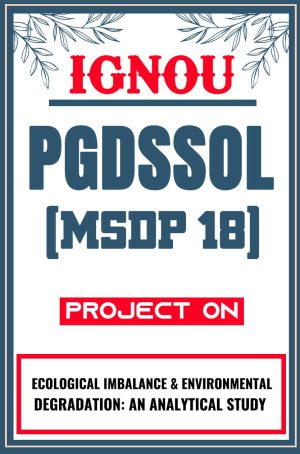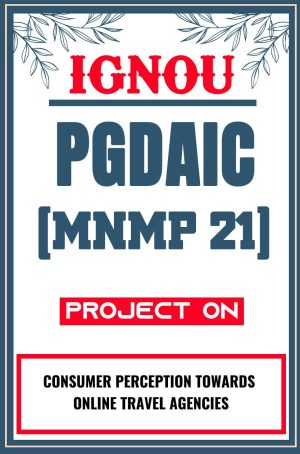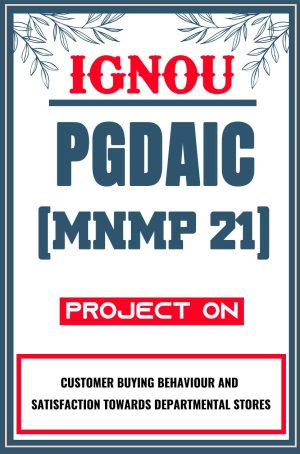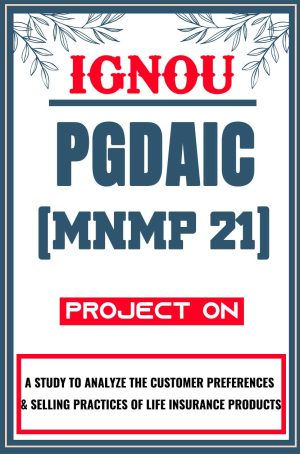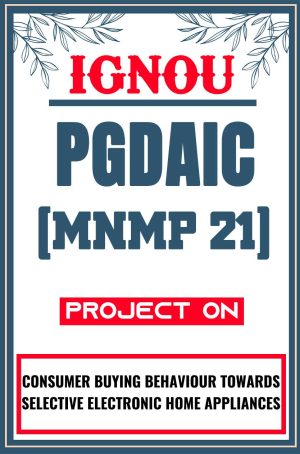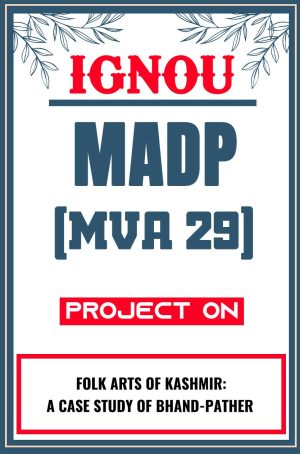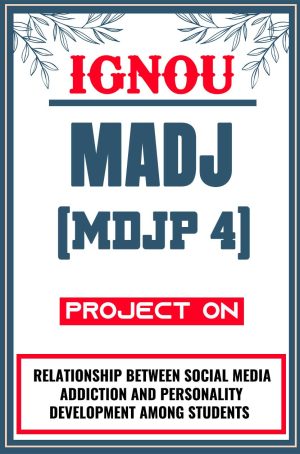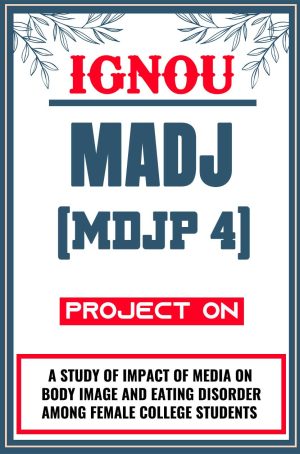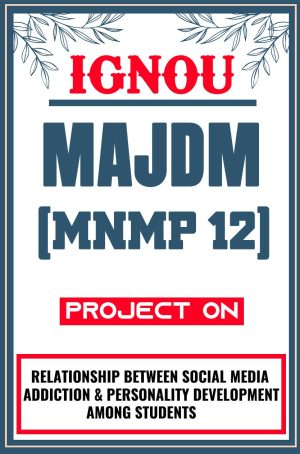Buy IGNOU Project Synopsis & Report in Hard-Copy
The Indira Gandhi National Open University (IGNOU) is a distance learning national university in India that provides various undergraduate, postgraduate, diploma, and certificate courses. As part of the curriculum for many of these programs, students are required to complete an IGNOU project. The IGNOU project aims to provide students with the opportunity to apply theoretical knowledge to practical situations, develop research skills, and demonstrate their ability to conduct independent studies.
Whatsapp us to get the Personalized (Customized) or Readymade IGNOU Project Report or IGNOU Synopsis
Check Availability And Get Started
Furthermore, we provided you with previously prepared IGNOU Project Reports or Synopsis. To check if any IGNOU projects are accessible for your degree, look for the topic code of your programme.
Note: Students can learn how to prepare IGNOU project synopsis reports by reviewing these prewritten examples. Many students could consider purchasing them. Projects submitted by other students previously are not accepted by IGNOU. For a project that has never been submitted by another student and that we guarantee will be accepted, WhatsApp us at 9958947060 and specify the subject of your project.
|
MBA |
MAPC | BTS |
| MADE | MSCCFT |
PGDPPED |
|
DNHE |
MPA | AMT |
| PGDRD | PGDEMA |
MEC |
|
DECE |
DPLAD | MSW |
| PGCPP | MAAE |
MSC (MACS) |
|
CCP |
CPSCM |
CES |
|
DAQ |
PGDDC |
PGDIDM |
|
PGDBP |
PGDCSR | PGDLAN |
| MSCENV | MGPS |
MAAN |
|
CAHT |
PGDWGS | PGDSS |
| PGDET | MAWGS |
MADVS |
|
MASS |
MACSR | MAUS |
| MARDOL | PGDRDOL |
BTSOL |
|
BAFSM |
BAVMSME | PGDECFE |
| MCOMOL | PGDIDMOL |
PGDDCOL |
|
PGDEOHOL |
MBAOL |
MBAOL |
|
DTSOL |
MAGPSOL | MAEC |
| MAJDM | MAJEM |
MADJ |
|
PGDSSOL |
MAEDU | MTTM |
| MED | MED |
AHE |
|
MPS |
MSCDFSM | PGDHE |
| PGDFSQM | PGDCJ |
MLIS |
|
PGCINDS |
DSCDM | PGDHHM |
| BSCANH | BAVTM |
PGDEOH |
|
MCOM |
MAEOH | PGDAB |
| PGCIPWS | PGDINDS |
PGDEME |
|
DNHEOL |
MAJMCOL | MBAOL |
| MAMIDI | MAWGSR |
PGDAIC |
|
DTS |
MARD | PGDDM |
| PGDIS | DIPP |
CSWATT |
|
PGCIPWS |
MAER | MAJMC |
| BAPFHMH | PGDFCS |
BAPCH |
|
MSCRWEE |
MSCFSQM | CETM |
| MADEOL | MBAOL |
MAEVS |
|
MADP |
CHCWM | CIHL |
| MSCIS | MAGD |
MAFCS |
|
PGDUPDL |
PGDMIDI | MASSOL |
| CPSCMOL |
DWM |
What is creative writing in IGNOU?
The Programme provides understanding, skills and professional knowledge in the art of imaginative writing in order to develop the creative ability of those interested in taking up writing as a career.
What is the project fee in IGNOU?
- Up to 4 credit project work: Rs.300.
- Above 4 credits project work: Rs.500.
What is the font size of IGNOU project?
Font Style Times New Roman and Font Size 12. Table of Contents – The table of contents should list all headings, sub headings after the table of contents page, as well as any titles preceding it. The title page and Certificate will not find a place among the items listed in the Table of Contents.
Can you use online resources for your IGNOU project research?
Yes, you can and should use online resources for your project research. Here’s how you can effectively utilize online resources while ensuring academic integrity:
Identifying Reliable Sources:
- Academic Databases: Use reputable academic databases such as JSTOR, PubMed, IEEE Xplore, or Google Scholar to find scholarly articles, research papers, and conference proceedings relevant to your topic.
- University Libraries: Many universities provide online access to extensive digital libraries that include journals, books, and other academic resources.
- Official Websites: Government websites, international organizations, and professional associations often publish reports, statistics, and research findings that can support your project.
Searching Strategies:
- Keywords: Use specific keywords and phrases related to your research topic to refine your search results and find relevant literature.
- Filters: Utilize filters on search engines and databases to narrow down results based on publication date, study type, or geographical location.
Evaluating Sources:
- Peer-reviewed Articles: Prioritize peer-reviewed articles and journals, as they undergo rigorous evaluation by experts in the field.
- Credibility: Evaluate the credibility of sources by checking the author’s credentials, publication venue, and whether the information is supported by reputable institutions or organizations.
- Currency: Ensure the information is up-to-date and reflects current research and developments in your field.
Avoiding Plagiarism:
- Cite Properly: Always cite sources correctly using the citation style specified by IGNOU (e.g., APA, MLA). Provide proper attribution whenever you use ideas, data, or direct quotes from online sources.
- Paraphrase and Synthesize: Avoid copying and pasting text verbatim from online sources. Instead, paraphrase information in your own words and synthesize ideas from multiple sources to create a cohesive argument.
Ethical Considerations:
- Copyright Compliance: Respect copyright laws and permissions when using online materials. Seek permission or use materials under fair use guidelines as appropriate.
- Data Privacy: Be mindful of data privacy and confidentiality issues, especially when using data obtained from online sources.
Can you conduct primary research for your IGNOU project?
Yes, you can definitely conduct primary research for your IGNOU project! In fact, it’s encouraged in many cases. Primary research allows you to gather fresh data specific to your topic and contribute new insights to the field.
Here are some things to consider about using primary research in your project:
- Project Type: Some projects may be more suited to secondary research using existing data and literature. Check with your program coordinator if your project topic aligns well with primary research methods.
- Data Collection Methods: There are various ways to collect primary data, such as surveys, interviews, focus groups, or case studies. Choose a method that aligns with your research question and is feasible given your resources (time, budget).
- Sample Size: IGNOU likely has guidelines for sample size depending on your research method. Ensure you collect enough data for robust analysis.
- Ethical Considerations: If your research involves human participants, you need to ensure informed consent and follow ethical research protocols. Your program coordinator can advise you on this.
Here are some resources that might be helpful:
- Project Work Guide: This guide provides a general overview of the project work process, including research methodology. https://onlineproject.ignou.ac.in/projectjun24/
- Research Methods Textbooks: There are many textbooks available that provide a detailed explanation of different research methods and how to conduct them properly. Your local library or online resources can be helpful here.
- University Librarian: Librarians can be a valuable resource to help you find relevant research materials and ethical research guidelines.
How do you handle plagiarism in your IGNOU project?
Handling plagiarism in your project is crucial for maintaining academic integrity and ensuring that your work is original. Here are detailed steps and best practices to avoid plagiarism and properly handle sources in your project:
Steps to Handle Plagiarism in Your Project
1. Understand What Constitutes Plagiarism
- Direct Plagiarism: Copying text word-for-word from a source without proper attribution.
- Self-Plagiarism: Reusing your previous work or parts of it without permission or acknowledgment.
- Paraphrasing Plagiarism: Rewriting someone else’s ideas or text too closely to the original without proper citation.
- Mosaic Plagiarism: Piecing together phrases and ideas from various sources to create a new text without proper attribution.
- Accidental Plagiarism: Unintentionally failing to cite sources or misquoting them.
2. Use Proper Citation and Referencing
- In-Text Citations: Always cite the source of any idea, data, or text that is not your own, following the citation style specified by IGNOU (e.g., APA, MLA, Chicago).
- Reference List: Include a comprehensive list of all sources cited in your project at the end of your report.
3. Paraphrase Correctly
- Understand the Source: Read and fully understand the original text.
- Use Your Own Words: Rewrite the idea in your own words without looking at the original text.
- Cite the Source: Even when paraphrasing, you must provide an in-text citation to acknowledge the original author.
4. Use Quotation Marks for Direct Quotes
- Short Quotes: Enclose short quotes (usually less than 40 words) in quotation marks and include an in-text citation.
- Block Quotes: For longer quotes, format them as a block quote (indented from the rest of the text) without quotation marks, and provide an in-text citation.
5. Maintain Accurate Records of Sources
- Notes: Keep detailed notes of all sources you consult, including page numbers, authors, publication dates, and URLs for online sources.
- Bibliography Software: Use reference management tools like Zotero, EndNote, or Mendeley to organize and manage your sources.
6. Use Plagiarism Detection Tools
- Software: Use plagiarism detection software such as Turnitin, Grammarly, or other similar tools provided by your institution to check the originality of your work.
- Revise: If the software flags any sections, revise them appropriately to ensure proper citation and originality.
7. Seek Guidance
- Consult Your Guide: Discuss with your project guide about proper citation practices and how to avoid plagiarism.
- University Resources: Utilize resources provided by IGNOU, such as writing centers, libraries, and online guides on academic writing and plagiarism.
What is a synopsis, and do I need to submit one?
A synopsis for your IGNOU project is essentially a detailed plan outlining your research project. It acts as a blueprint that gets approved by your program coordinator or supervisor before you delve into the full project.
Yes, submitting a synopsis is mandatory for most IGNOU projects. It allows your supervisor to assess your project’s feasibility, focus, and methodology (if applicable). They can provide valuable feedback and ensure your project aligns with program requirements before you invest significant time and effort.
What if I need help with data analysis for my research?
Here are some options to consider if you need help with data analysis for your IGNOU project:
University Resources:
- Librarians: Your university librarian is a great first stop. They can help you find resources on various data analysis techniques based on your research method (surveys, interviews, etc.). They may also be able to point you towards software tutorials or online courses.
- Statistics Department (if available): Some IGNOU campuses might have a dedicated statistics department. If so, they might offer workshops or consultations on data analysis techniques relevant to your field.
Online Resources:
- Free Online Courses: Several platforms like Coursera, edX, and Udemy offer free introductory courses on data analysis and statistics. These courses can teach you the basics of data cleaning, analysis tools, and interpreting results.
- Statistical Software Tutorials: Popular statistical software like SPSS, R, or Excel often have extensive online tutorials and user guides. These resources can teach you how to use the software for specific data analysis tasks relevant to your project.
Other Options:
- Consult a Statistician: If your data analysis needs are complex, consider consulting a statistician with experience in your field. They can provide personalized guidance and ensure your analysis is conducted correctly.
- Research Colleagues or Peers: If you know someone with research experience, especially in data analysis, reach out to them for guidance. They might be able to offer helpful tips or resources based on their own experience.
Can you extend the deadline for submitting your IGNOU project?
Extending the deadline for submitting your project is possible under certain circumstances, but it’s best to be proactive and discuss it with your program coordinator well before the original due date. Here’s why:
- Understanding the Flexibility: There might be specific university guidelines or program-level regulations regarding deadline extensions. Your program coordinator can clarify the process and eligibility for your situation.
- Strong Justification Needed: A valid reason for the extension request is crucial. Examples might include documented medical emergencies, unforeseen personal circumstances, or delays in obtaining critical research data (with documented proof).
- Timely Request is Key: The earlier you approach your coordinator, the better. This shows initiative and allows them to assess your situation and provide guidance. Last-minute requests are less likely to be approved.
Here’s what you can do:
- Gather Documentation: If you have any documents supporting your reason for needing an extension (e.g., doctor’s note), collect them beforehand.
- Prepare a Written Request: Draft a formal request outlining the reason for the extension and the additional time you need.
- Meet with Your Coordinator: Discuss your situation with your program coordinator in person or through a formal email. Be clear, concise, and professional in your communication.
Get our expert help for your IGNOU Project Synopsis & Report
We offer hard copies of ready-made IGNOU Projects and Synopsis that are correctly written, complete, and based on research. To find out if IGNOU Projects Reports and IGNOU Synopsis are available for your course, look at the subject code.
As soon as we receive your payment, we’ll send your Project Report & Synopsis by speed-post that same day. Another thing is that if you have any questions or need help, please WhatsApp us at 9958947060.
Note: Please remember that these are example Project Report and Synopsis that have already been written so that students can learn how to write their own. They might be something that a lot of people want to buy. It’s possible that these projects will be rejected by IGNOU because they don’t accept projects that have already been done.
If you want a project that hasn’t in rejected by anyone else and is guaranteed to be accepted, text us at 9958947060 and tell us about your project topic.
It can be hard to pick a project, especially when there are a lot of potential projects available. You should choose us because of these things:
- We promise that you will be happy with your project, which is one of the main reasons why students choose our services. If you choose our project work, you can be sure that it will be accepted. If it gets rejected (which is very unlikely!), we’ll give you another one at no extra cost.
- Our projects strictly follow the IGNOU rules. When you look at our projects and compare them to others’, you’ll see how closely we follow IGNOU rules.
- Ready-made and unique projects are both available: we offer both types of projects. You can use ready-made projects or make your own projects based on your needs.
- Call us or WhatsApp us at: 9958947060, 9354637830
- Visit: SHRICHAKRADHAR.COM
-
Sale!

-
Sale!

IGNOU PGDSSOL Project (MSDP 18) Synopsis/Proposal & Project Report/Dissertation in Hard-Copy (Sample-4)
Original price was: ₹499.00.₹249.00Current price is: ₹249.00. -
Sale!

IGNOU PGDSSOL Project (MSDP 18) Synopsis/Proposal & Project Report/Dissertation in Hard-Copy (Sample-3)
Original price was: ₹499.00.₹249.00Current price is: ₹249.00. -
Sale!

IGNOU PGDSSOL Project (MSDP 18) Synopsis/Proposal & Project Report/Dissertation in Hard-Copy (Sample-2)
Original price was: ₹499.00.₹249.00Current price is: ₹249.00. -
Sale!

IGNOU PGDSSOL Project (MSDP 18) Synopsis/Proposal & Project Report/Dissertation in Hard-Copy (Sample-1)
Original price was: ₹499.00.₹249.00Current price is: ₹249.00. -
Sale!

IGNOU DWM Project (BNRP 108) Synopsis/Proposal & Project Report/Dissertation in Hard-Copy (Sample-4)
Original price was: ₹499.00.₹249.00Current price is: ₹249.00. -
Sale!

IGNOU DWM Project (BNRP 108) Synopsis/Proposal & Project Report/Dissertation in Hard-Copy (Sample-3)
Original price was: ₹499.00.₹249.00Current price is: ₹249.00. -
Sale!

IGNOU DWM Project (BNRP 108) Synopsis/Proposal & Project Report/Dissertation in Hard-Copy (Sample-2)
Original price was: ₹499.00.₹249.00Current price is: ₹249.00. -
Sale!

IGNOU DWM Project (BNRP 108) Synopsis/Proposal & Project Report/Dissertation in Hard-Copy (Sample-1)
Original price was: ₹499.00.₹249.00Current price is: ₹249.00. -
Sale!

IGNOU PGDAIC Project (MNMP 21) Synopsis/Proposal & Project Report/Dissertation in Hard-Copy (Sample-5)
Original price was: ₹499.00.₹249.00Current price is: ₹249.00. -
Sale!

IGNOU PGDAIC Project (MNMP 21) Synopsis/Proposal & Project Report/Dissertation in Hard-Copy (Sample-4)
Original price was: ₹499.00.₹249.00Current price is: ₹249.00. -
Sale!

IGNOU PGDAIC Project (MNMP 21) Synopsis/Proposal & Project Report/Dissertation in Hard-Copy (Sample-3)
Original price was: ₹499.00.₹249.00Current price is: ₹249.00. -
Sale!

IGNOU PGDAIC Project (MNMP 21) Synopsis/Proposal & Project Report/Dissertation in Hard-Copy (Sample-2)
Original price was: ₹499.00.₹249.00Current price is: ₹249.00. -
Sale!

IGNOU PGDAIC Project (MNMP 21) Synopsis/Proposal & Project Report/Dissertation in Hard-Copy (Sample-1)
Original price was: ₹499.00.₹249.00Current price is: ₹249.00. -
Sale!

IGNOU MADP Project (MVA 29) Synopsis/Proposal & Project Report/Dissertation in Hard-Copy (Sample-5)
Original price was: ₹499.00.₹249.00Current price is: ₹249.00. -
Sale!

IGNOU MADP Project (MVA 29) Synopsis/Proposal & Project Report/Dissertation in Hard-Copy (Sample-4)
Original price was: ₹499.00.₹249.00Current price is: ₹249.00. -
Sale!

IGNOU MADP Project (MVA 29) Synopsis/Proposal & Project Report/Dissertation in Hard-Copy (Sample-3)
Original price was: ₹499.00.₹249.00Current price is: ₹249.00. -
Sale!

IGNOU MADP Project (MVA 29) Synopsis/Proposal & Project Report/Dissertation in Hard-Copy (Sample-2)
Original price was: ₹499.00.₹249.00Current price is: ₹249.00. -
Sale!

IGNOU MADP Project (MVA 29) Synopsis/Proposal & Project Report/Dissertation in Hard-Copy (Sample-1)
Original price was: ₹499.00.₹249.00Current price is: ₹249.00. -
Sale!

IGNOU MADJ Project (MDJP 4) Synopsis/Proposal & Project Report/Dissertation in Hard-Copy (Sample-4)
Original price was: ₹499.00.₹249.00Current price is: ₹249.00. -
Sale!

IGNOU MADJ Project (MDJP 4) Synopsis/Proposal & Project Report/Dissertation in Hard-Copy (Sample-3)
Original price was: ₹499.00.₹249.00Current price is: ₹249.00. -
Sale!

IGNOU MADJ Project (MDJP 4) Synopsis/Proposal & Project Report/Dissertation in Hard-Copy (Sample-2)
Original price was: ₹499.00.₹249.00Current price is: ₹249.00. -
Sale!

IGNOU MADJ Project (MDJP 4) Synopsis/Proposal & Project Report/Dissertation in Hard-Copy (Sample-1)
Original price was: ₹499.00.₹249.00Current price is: ₹249.00. -
Sale!

IGNOU MAJEM Project (MJMP 120) Synopsis/Proposal & Project Report/Dissertation in Hard-Copy (Sample-5)
Original price was: ₹499.00.₹249.00Current price is: ₹249.00. -
Sale!

IGNOU MAJEM Project (MJMP 120) Synopsis/Proposal & Project Report/Dissertation in Hard-Copy (Sample-4)
Original price was: ₹499.00.₹249.00Current price is: ₹249.00. -
Sale!

IGNOU MAJEM Project (MJMP 120) Synopsis/Proposal & Project Report/Dissertation in Hard-Copy (Sample-3)
Original price was: ₹499.00.₹249.00Current price is: ₹249.00. -
Sale!

IGNOU MAJEM Project (MJMP 120) Synopsis/Proposal & Project Report/Dissertation in Hard-Copy (Sample-2)
Original price was: ₹499.00.₹249.00Current price is: ₹249.00. -
Sale!

IGNOU MAJEM Project (MJMP 120) Synopsis/Proposal & Project Report/Dissertation in Hard-Copy (Sample-1)
Original price was: ₹499.00.₹249.00Current price is: ₹249.00. -
Sale!

IGNOU MAJDM Project (MNMP 12) Synopsis/Proposal & Project Report/Dissertation in Hard-Copy (Sample-4)
Original price was: ₹499.00.₹249.00Current price is: ₹249.00. -
Sale!

IGNOU MAJDM Project (MNMP 12) Synopsis/Proposal & Project Report/Dissertation in Hard-Copy (Sample-3)
Original price was: ₹499.00.₹249.00Current price is: ₹249.00.





